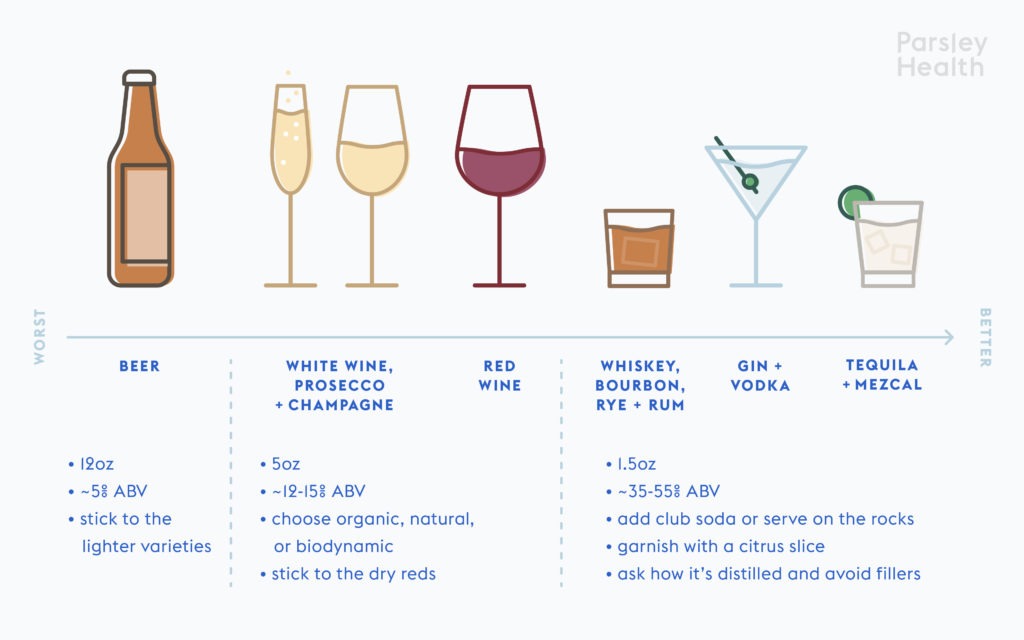Understanding the effects of alcohol on your health can be confusing – sometimes the headlines say alcohol may be good for you, such as red wine supporting heart health, whilst other sources say even a small amount may be detrimental to your health. Whilst drinking to excess will most certainly increase your risk of many diseases including heart disease and cancer, the jury is still out on drinking in moderation.
If you do drink, it’s useful to know that different types and amounts of alcohol can affect you in different ways. Whilst alcohol can never really be considered healthy, read on to find out about some of the most popular types of alcohol and how they might impact your health.
Your at-a-glance guide:

Beer
The way beer is made means that it contains simple carbohydrates and empty calories but minimal nutrients. Sugars and unmalted grains are often added to enhance flavour which can further increase the amount of carbs and calories. This is important to consider if you have diabetes, need to manage your blood sugar or are watching your weight.
The higher the alcohol by volume (ABV) of a beer, the higher the alcohol and the calories. Darker beers typically have a higher ABV, so it’s probably best to stick to lighter varieties.
Many beers are made from wheat or barley grains which contain gluten. Gluten should be avoided by people with coeliac disease, non-coeliac gluten sensitivity, and wheat allergies. Nowadays there are a number of gluten free beers available. There has been a trend for many breweries to produce beers with minimal alcohol content and it is worth trying them as they can often have all of the taste with none of the alcohol-related issues.
Whilst some studies suggest there may be some benefits of drinking beer, studies show that beer intake is directly related to increased waist circumference and body weight, and higher intakes are associated with abdominal obesity.
Wine
Similar to beer, wine also contains carbohydrates and sugars but it’s also packed with antioxidants which are beneficial to health. Red wine contains 10x more antioxidants than other types of alcohol because it’s made with the skin, seeds and sediment of the grape intact. White and rosé wines, champagne and prosecco have fewer antioxidants, but these are lower in calories than red wine.
There are conflicting scientific studies on the benefits of wine – research has found that the antioxidants Resveratrol and Quercetin have been linked to benefits such as regulating blood pressure1,2 and improving neurological function3,4 but other studies have not found a positive impact on health or longevity. Despite these potential health benefits, it’s worth remembering that they only apply if wine is drunk in moderation – individuals who drink around 1 serving per day of red wine have a 32% lower risk of heart disease, but any more than that dramatically increases the risk of cardiovascular events.
Sulphites found in wine may also be a problem for some people. Sulphites naturally occur during the wine-making process but are often also added as preservatives and may cause reactions such as dizziness, flushing, trouble swallowing, and upset stomach. Under EU regulations, organic wine has fewer sulphites than their conventional counterparts, and if sulphites are added, it must be included on the label.
Spirits
Whilst spirits have a higher percentage of alcohol, on their own they contain no carbohydrates or sugar so theoretically they’re least likely to impact your blood sugar and metabolism. Adding sugar-laden mixers will however increase the carbohydrate content, so it might be best to choose low-sugar or low-calorie mixers if you need to manage your blood sugar.
Even though some whiskeys, vodkas and gins are distilled from gluten-containing grains wheat, barley, rye, the distillation process during manufacture removes all traces of gluten so they are safe to drink for people with coeliac disease and gluten sensitivity.
What Are the UK’s Drinking Guidelines?
These guidelines from the UK Chief Medical Officers have been set to reduce the risk of cancer and other diseases. Keep your short-term risks low by:
- Drinking no more than 14 units per week
- Limiting the total amount of alcohol in one session
- Drinking more slowly, alternating with food and/or water
- Have several drink-free days per week
- Switching to low or no alcohol drinks
If you’re pregnant, don’t drink at all.
Additional sources:
- Liu, Y et al (2015) ‘Effect of resveratrol on blood pressure: a meta-analysis of randomized controlled trials’ Clinical Nutrition, 34(1), pp.27-34.
- Zahedi, M et al. (2013) “Does Quercetin Improve Cardiovascular Risk factors and Inflammatory Biomarkers in Women with Type 2 Diabetes: A Double-blind Randomized Controlled Clinical Trial.” International journal of preventive medicine, 4(7). pp.777-785.
- Amanzadeh, E et al (2019) ‘Application of quercetin in neurological disorders: from nutrition to nanomedicine’, Rev Neurosci. 30(5), pp.555-572.
- Braidy, N et al (2016) ‘Resveratrol as a Potential Therapeutic Candidate for the Treatment and Management of Alzheimer’s Disease’ Curr Top Med Chem. 16(17), pp.1951-1960.
